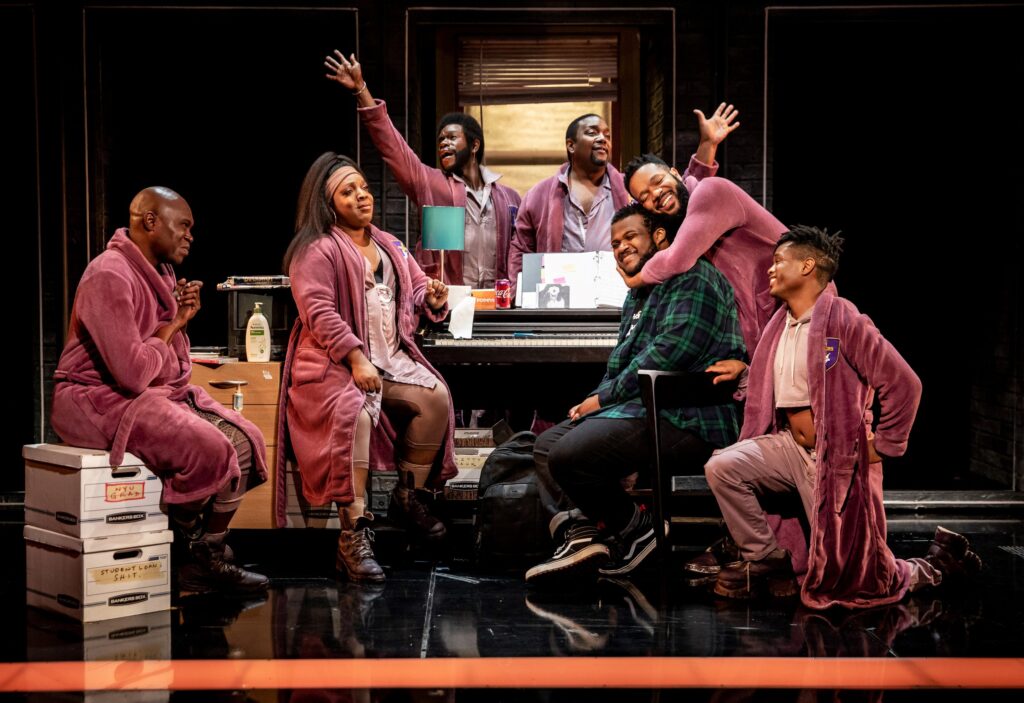“Before there was a role there was a song,” says actor John-Andrew Morrison, who plays the characters Thought 4 and Usher’s Mother in Michael R. Jackson’s Pulitzer Prize–winning A Strange Loop (Thu/18-May 12, Toni Rembe Theater at ACT, SF.) “The song was ‘Periodically,’ and when Michael first presented it to me, I remember thinking, Oh, this is an extraordinary piece of writing. I first sang it for a cabaret in 2008; long before there was a musical called A Strange Loop. I was thrilled to be able to do it.”
A Strange Loop premiered in 2019 at Playwrights Horizons and traveled in 2021 to Washington DC’s Woolly Mammoth Theatre Company. Reaching Broadway in spring 2022, Jackson’s play won the Pulitzer Prize for Drama and garnered 11 Tony Award nominations, winning for Best Musical and Best Book of a Musical. The show also took Best Musical by New York Drama Critics’ Circle, Drama Desk, Outer Critics Circle, Drama League, and Off-Broadway Alliance. Morrison received a Tony Nomination, a Lucille Lortel Award, and an OBIE Award for his work in the play.
In the self-referential loop-world of the play, protagonist Usher (who works as an usher at a Broadway show while writing a musical about a gay Black man named Usher who works as an usher at a Broadway show, and so on and so on), played by Malachi McCaskill, writes his own self-description: He is “a young overweight-to-obese homosexual and/or gay and/or queer, cisgender male, able-bodied university-and-graduate-school educated, musical theater-writing, Disney-ushering, broke-ass middle-class politically homeless normie leftist Black American descendant of slaves who thinks he’s probably a vers bottom.”
As Usher searches for self-acceptance and identity he is surrounded by six inner selves (Thoughts) who mock and undermine his essence, shred his soul, and punish him with messages layered with fatphobia, homophobia, anti-Blackness, and more. His Bible-thumping parents and other taunting personifications are stretched by Jackson to absurdist levels that blend humor and devastating cruelty into a frothy cocktail. Sadness and laughter nestle together in the story’s truths; characters love, but do so imperfectly—or in ways thought strange by some people. It is a show offering a handle for anyone (especially Black, queer men but not only Black, queer men) to grab onto as the messy, loopy, wild ride of life unfolds.
The Thoughts chide and guide Usher along his path, and Morrison, as Thought 4, voices a key moment in “Periodically.” “As I’ve grown as an actor, that song has shown up. I’d do a play, I’d learn about how I show up, and then Michael would come ask me to do the song again. Through all the years I found layers within the song and the part and this woman, Usher’s mom. One of the most significant things Michael did for me was let me listen to voicemails to him from his mother. I instantly heard the love she has for her son. Even though what’s said was sometimes painful.
“It was like my mom, who would always say, ‘If I didn’t care about you I wouldn’t fuss on you.’ The song took a different shape for me after my mom had a stroke right before the pandemic lockdown. I went home to Jamaica and was her chief nurse and bottle washer for six months.”

Morrison’s mother used to take him to see Broadway shows when he was young and it was bittersweet that she was too ill to see his Broadway debut. “That’s why I take my mom onstage with me every day to play this mom. My mom suffers from aphasia and no longer has language. It’s been challenging because you can see what she wants to say in her eyes.” In a final scene, Morrison uses a head turn and facial expression his mother has developed for when the words might be “say that again, I need clarity.”
George Ferencz, a hugely influential director and mentor at La Mama who passed away in 2021, once told him to remember all the details of a moment: how your breathe felt, what caught you off guard, facial expressions and gestures that demonstrate individuality. This causes him to reassess how heavy his grief about his mother feels, someone laughing at a friend’s funeral, the tightening of a loved one’s eyes just before an argument—and then weave those threads into the quilt of his characters. “In a way, I take George onstage also, because he had faith and confidence in me when I didn’t have it for myself.”
Help us save local journalism!
Every tax-deductible donation helps us grow to cover the issues that mean the most to our community. Become a 48 Hills Hero and support the only daily progressive news source in the Bay Area.
Morrison calls on those notes of confidence during “Precious Little Dream,” the fight song he finds hardest to sing and struggles to talk about. “It feels hard because it is the most directly vicous.” After an extended pause, he continues, “I’m sorry, you’re making me cry already… but there are parts of the song that are so hard because I’ve had moments where people have been vicious to me and I know how much that imprinted on me. Even sometimes things meant as protection.
“At about age seven, as a very flamboyant kid, I remember being with my mom and this macho dad marched in and stood there. My mom leaned in and very quietly said, ‘My dear, that is how real men stand, how men walk.’ That was a Jamaican mom trying to protect her kid in a very homophobic country; I get it. But I still remember it to this day. Our relationship is great, but things have been said, and there’s a weird protection I feel for this young soul in the play that hurts my head and my heart. There’s a part I sing as Mother that is about ‘like a real Black man would want to kiss you.’ That’s so hard and damning.”
“Periodically,” in some ways Morrison’s signature song, offers three distinct expressive platforms. “It starts with playfulness, then there’s a wonderful dramatic arc to an almost forlorn love at the end. In the middle there’s hell and damnation that happens. You have to be on your game, but it’s also a ride. If you can follow and enjoy the ride, it’s wonderful to sing, even though challenging. There is a crazy, sustained transition from section A to section B and getting the breath to sing that is tricky. It’s a tremendous, painful song. I’m blessed I was able to sing a song like that in my career.”

About the overall production and its impact on audiences, Morrison says the honesty and specificity of Jackson’s script and lyrics speak truth. “There’s joy in taking something to the ridiculous, like when Usher’s Black ancestors come out of the ground to admonish him for not being Black enough. Many Black actors have heard this from both Black and white people. I remember auditioning in the early aughts and white casting directors would look at me and say, “Can you be more Black?” It was obviously stated or coded in deliberate ways. And because of the way I speak, Black people have said, “You’re trying to act white.” So that song goes to the umpteenth ridiculous level, but it’s specific to forms of Blackness that white and Black people find acceptable.”
What he has discovered is that the show is like a cypher into humanity and that draws in every type of person. “They say, ‘Oh, that’s my family. That’s my romance. I know that church trauma or that damning voice all too well.’ It’s allowed people to heal and that’s one reason I wanted to come back to the show after stepping away to do other projects for a while.”
Morrison jumps to add a memory that continues to echo in his head and heart. “I can speak through the lens of Black queer performing artists. So many times I see something with an all-white cast that I am moved by but I have to project myself on it. What is wonderful about this show is that Black queer people get to see themselves without having to transmute themselves. What’s powerful about it is that people who are not Black and/or queer and do or don’t have religious trauma have found a way into the show.
“One night coming out of the theater, there was this stunning, stunning, beautiful white man leaning against a building, doubled-over, in tears. I asked him if he was OK and he said, ‘Yeah, it was just my story.’ I thought, we certainly were not telling your story but the fact that we were able to do that for him? That’s the singular power of theater, and of this play.”
A STRANGE LOOP Thu/18-May 12, Toni Rembe Theater at ACT, SF. More info here.





